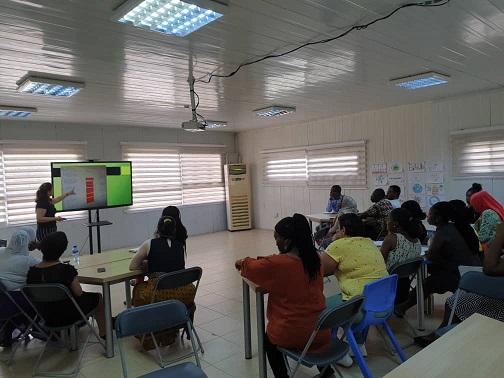
One of our star PYP facilitators, Ms. Rouba, went to Greece recently to attend a workshop on "Evidencing Learning Assessment". In true collaboration, this morning she held a workshop on this with the rest of her PYP Team.
Ms. Rouba spoke about the role of the facilitators and collaboration with the team as well as with the students as essential. Facilitators, she said, must play the role of creating the rubric with the students, and aiding the continuum as students use their agency to navigate their learning and conceptualization of their units. She also spoke about how students agency meant giving them a space to assess themselves as well for every learning engagement to better understand the concepts of their units.
As facilitators of the 21st century, keeping an open mind, we need to ask ourselves what we need to stop doing, what we should continue doing and what we should start doing in our classrooms. One of the essentials to ask deeper and more focused questions, going into techniques and encouraging collaboration.
Aside from collaboration and planning, facilitators should also use "Tuning In" for discussions and the creation of success criteria and display them in class for students to refer back to it. Prior to assessing, as facilitators, we should map out what the understanding needs to be of the various concepts and more. Thus, any assessment needs to target conceptual understanding.
As PYP Students, there is bound to be a lot of interaction with real-life situations and field trips. Ms. Rouba also references field trips as a way to assess students skills. For example, before going on the field trip, generating questions, taking notes during the trip and reflecting after the trip. Assessment, thus, is ongoing and generated.
Now going on to planning effective assessments, there are a few steps: one being to turn the Lines of Inquiry (LoI) into generalizations and conclusions. Second, breaking these generalizations to the key understanding of concepts, knowledge, and skills. Third, revising the assessment tools at hand. Finally, looking at the planer and incorporating new ideas to involve students in their own assessments.
To conclude, Ms. Rouba brings a couple of questions to reflect on. These are catered to learner agency supported through assessments, inquiry processes and possibilities of modifications, and also ensuring that assessment practices inform the learning and teaching communities and practices. Now the task is to apply these assessment tools to the PYP.
Stay tuned for more!